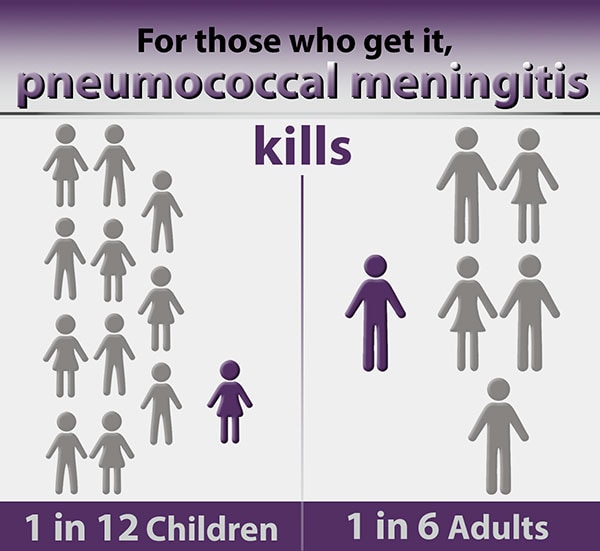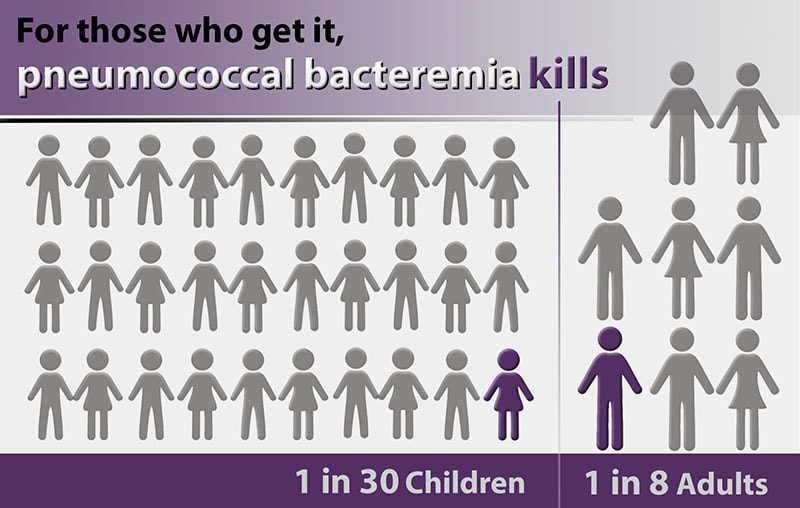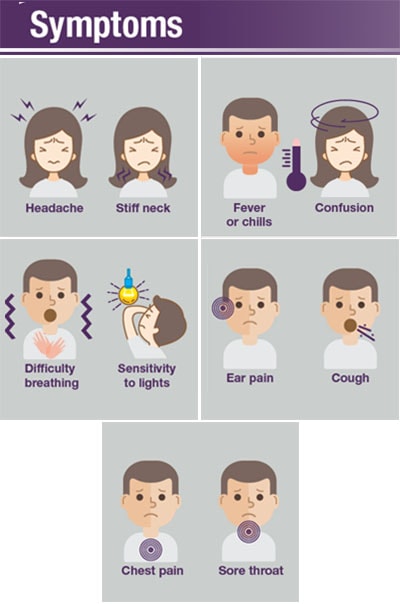Symptoms and Complications
Pneumococcal disease can include many different types of infections. Symptoms depend on the part of the body that is infected. Most pneumococcal infections are mild. However, some can be deadly or result in long-term problems.
Pneumonia
Symptoms of pneumococcal pneumonia, a lung infection, include:
- Fever and chills
- Cough
- Rapid breathing or difficulty breathing
- Chest pain
Older adults with pneumococcal pneumonia may experience confusion or low alertness, rather than the more common symptoms listed above.
Complications of pneumococcal pneumonia include:
- Empyema (infection around the lungs and in the chest cavity)
- Pericarditis (inflammation of the outer lining of the heart)
- Endobronchial obstruction (blockage of the airway that allows air into the lungs), with atelectasis (collapse within the lungs) and abscess (collection of pus) in the lungs
Pneumococcal pneumonia kills about 1 in 20 who get it.

Meningitis
Symptoms of pneumococcal meningitis, an infection of the lining of the brain and spinal cord, include:
- Stiff neck
- Fever
- Headache
- Photophobia (eyes being more sensitive to light)
- Confusion
In babies, meningitis may cause poor eating and drinking, low alertness, and vomiting.
About 1 in 12 children and 1 in 6 older adults who get pneumococcal meningitis dies of the infection. Those who survive may have long-term problems, such as hearing loss or developmental delay.

Blood infection
Symptoms of pneumococcal bacteremia, a blood infection, include:
- Fever
- Chills
- Low alertness
About 1 in 30 children with pneumococcal bacteremia die of it. Pneumococcal bacteremia kills about 1 in 8 adults who get it. For those who survive, pneumococcal bacteremia can lead to loss of limb(s).
Sepsis
Symptoms of sepsis, the body’s extreme response to an infection, include:
- Confusion or disorientation
- Shortness of breath
- High heart rate
- Fever, shivering, or feeling very cold
- Extreme pain or discomfort
- Clammy or sweaty skin
Complications of sepsis include kidney failure and damage to the brain, lungs, or heart.
Call your doctor right away if you think you or your child might have a serious pneumococcal infection
Middle ear infection
Symptoms of otitis media (middle ear infection), which pneumococcal bacteria commonly cause, include:
- Ear pain
- A red, swollen ear drum
- Fever
- Sleepiness
Ear infections are usually mild and are more common than the more severe forms of pneumococcal disease. However, some children develop repeated ear infections and may need ear tubes.
Sinus infection
Symptoms of sinus infections include:
- Headache
- Stuffy or runny nose
- Loss of the sense of smell
- Facial pain or pressure
- Postnasal drip (mucus building up in the back of the throat or nose)
Complications are rare, but include infection of the tissue surrounding the eyes, bone infection, and a painful abscess (collection of pus).





